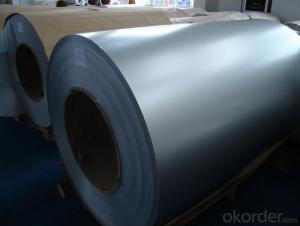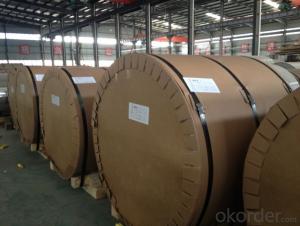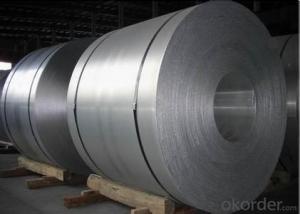Plain Aluminium Coils Used for Construction
- Loading Port:
- Shanghai
- Payment Terms:
- TT OR LC
- Min Order Qty:
- 5 m.t.
- Supply Capability:
- 100000 m.t./month
OKorder Service Pledge
OKorder Financial Service
You Might Also Like
1.Structure of Plain Aluminium Coils Used for Construction
Plain aluminium coils used for construction are good at ductility, heat conductivity, anti-corrosion and moisture resistance. They are widely used in roofing, electronics, instruments, lighting decoration, packing, decoration, curtain wall, sandwich panels, boats, etc.
Plain aluminium coils used for construction can meet the highest standards while save the cost. Our strong quality control term bring you the most-qualified products.
2.Main Features of Plain Aluminium Coils Used for Construction
•High intensity
•Easy to be processed and shaped
•Weather resistance
•Anti-pollution & environment protection
3. Plain Aluminium Coils Used for Construction Images
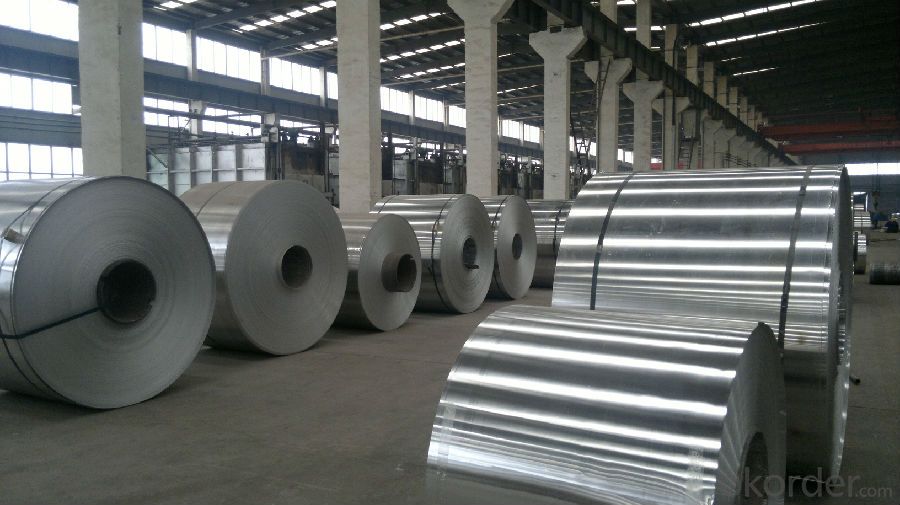
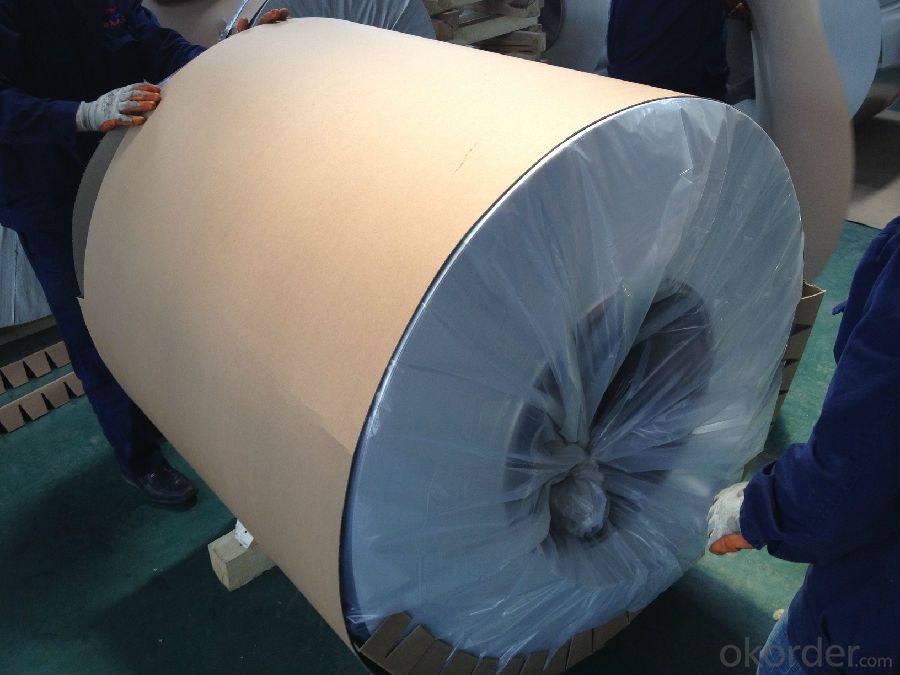
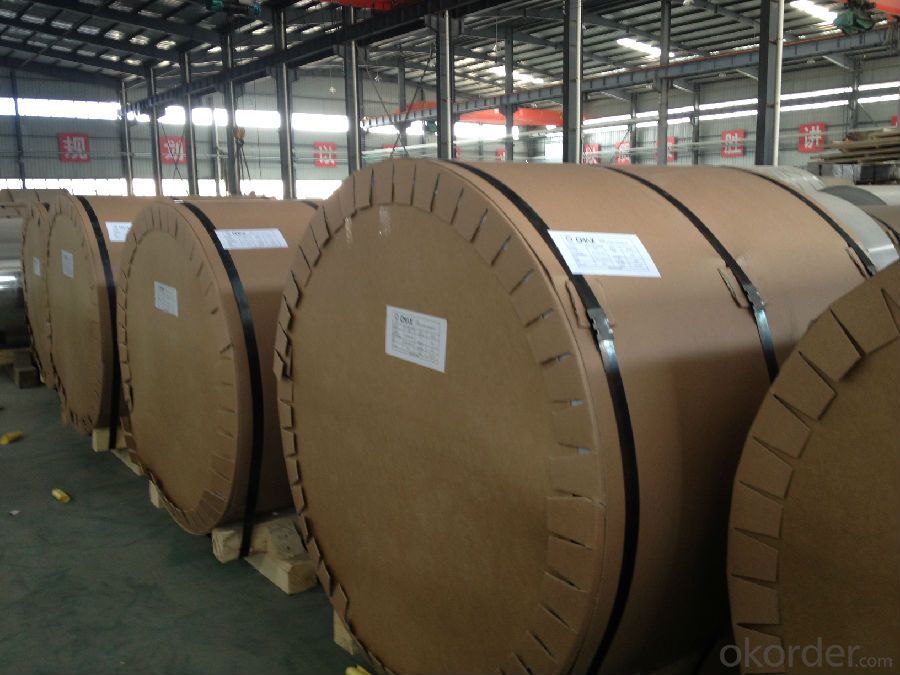
4.Specification of Plain Aluminium Coils Used for Construction
Alloy | AA1050,AA1060, AA1070, AA1100 |
Temper: | H12, H14, H16, H18, H22, H24, H26, H32,HO, F |
Thickness: | 0.10-500mm |
Width: | 10mm- 2200mm |
Standard: | GB/T3880-2006, ASTM, ISO, EU standard |
Special Specification is available on customer’s requirement | |
5. FAQ
A.What about inspections to guarantee quality?
For each order for Aluminum Coils, we will arrange strict inspection for raw materials, inspection during production and inspection for finished goods.
With requirement of customers, we also can arrange the third party inspection.
B.What about delivery?
We will put order for Aluminum Coils in production schedule after order gets confirmed against copy of TT or L/C. Normally it takes about one month for production. Exact shipment schedule is different based on different sizes and quantity.
C.What is the MOQ?
5 tons for each size.
D. Where have you exported aluminium Coils?
We have exported aluminum Coils to many countries. Main markets include South East Asia, Middle East, North America, South America, etc.
- Q:Are aluminum coils suitable for coil coating applications?
- Indeed, coil coating applications find aluminum coils to be a suitable option. Aluminum, owing to its outstanding resistance to corrosion, lightweight composition, and impressive strength-to-weight ratio, enjoys extensive usage in coil coating. Moreover, its high malleability facilitates effortless shaping and molding throughout the coil coating procedure. Furthermore, aluminum coils can be coated with an array of paints and coatings, offering a diverse selection of colors and finishes. To sum up, aluminum coils are a favored preference for coil coating applications due to their adaptability, longevity, and visually pleasing attributes.
- Q:Can aluminum coils be used in automotive manufacturing?
- Yes, aluminum coils can be used in automotive manufacturing. Aluminum is a lightweight and durable material, making it a suitable choice for various automotive components such as body panels, engine parts, and heat exchangers. Its corrosion resistance and recyclability also make it an attractive option for the automotive industry.
- Q:How is Aluminum formed??Thanks!!
- okorder nice.
- Q:How are aluminum coils used in the production of consumer electronics?
- Consumer electronics rely heavily on the utilization of aluminum coils for a multitude of purposes. A prevalent example is their application in the creation of heat sinks. These heat sinks are instrumental in dissipating the heat produced by electronic components like microprocessors, thus averting overheating and ensuring optimal performance. To achieve this, aluminum coils are often molded into fins or plates and subsequently affixed to these components, exploiting the exceptional thermal conductivity of aluminum. Another way aluminum coils find use in the realm of consumer electronics is through their incorporation into electromagnetic shields. The primary objective of these shields is to obstruct or redirect electromagnetic interference (EMI) generated by electronic devices. Given aluminum's exceptional electrical conductivity, it is an ideal material for the construction of these shields. Manufacturers shape the coils into diverse forms and sizes in accordance with the specific requirements of the electronic device, seamlessly integrating them into the overall design to minimize EMI. In addition, aluminum coils serve a vital purpose in the production of electrical connectors and wiring within consumer electronics. Aluminum's lightweight nature, durability, and commendable electrical conductivity make it an excellent choice for these applications. Manufacturers frequently process and shape the coils into thin, flexible strips or wires that can be effortlessly integrated into the electronic circuitry. To summarize, the indispensability of aluminum coils in the manufacturing process of consumer electronics is undeniable. Their ability to function as heat sinks for thermal management, electromagnetic shields for EMI protection, and electrical connectors and wiring for efficient electrical conductivity underscores their versatility. Coupled with their outstanding thermal and electrical properties, aluminum coils are an integral component in the production of a diverse range of consumer electronic devices.
- Q:Are aluminum coils suitable for soundproofing applications?
- Typically, soundproofing applications do not involve the use of aluminum coils. Although aluminum is an effective conductor of heat and electricity, it lacks the sound-dampening properties found in other commonly used soundproofing materials like foam, rubber, or dense fibers. These materials are designed to absorb and block sound waves, thereby reducing noise transmission. Conversely, aluminum coils are commonly utilized in HVAC systems or as a building exterior material due to their durability and heat transfer capabilities. Consequently, if the primary goal is soundproofing, it is advisable to explore alternative materials specifically engineered for that purpose.
- Q:why do we use copper more than aluminum? give some characteristic of copper that makes it better then aluminum?
- more ductile, better conductor. thats about it. we use it for wires and electrical stuff. aluminum is for hard things like cans or cars.
- Q:I am sanding tool marks out of aluminum rims and plan on polishing them. Any help to make sanding them easier would be welcome.
- Eastwood okorder /
- Q:Can aluminum coils be used in the production of railway tracks?
- The usage of aluminum coils in the production of railway tracks is not possible. Typically, railway tracks are manufactured using steel due to multiple reasons. Steel is renowned for its strength and durability, enabling it to endure the heavy loads and constant wear and tear caused by train traffic. Additionally, it exhibits exceptional heat resistance and can maintain its structural integrity even when exposed to high temperatures. This attribute holds significant importance for tracks that encounter friction and heat generated by moving trains. Conversely, aluminum possesses a lighter weight and lower strength compared to steel, along with inferior heat resistance. While aluminum may find application in other elements of railway infrastructure, such as electrical wires or specific train components, it is unsuitable for the actual production of railway tracks.
- Q:How are aluminum coils used in the production of industrial machinery?
- Due to their unique properties and benefits, aluminum coils find wide usage in the production of industrial machinery. These coils are typically crafted from high-quality aluminum alloy, which offers outstanding strength, durability, and resistance to corrosion. One notable application of aluminum coils in industrial machinery lies in the manufacturing of heat exchangers. Heat exchangers play a pivotal role in diverse industrial processes, including refrigeration, HVAC systems, and power generation. Aluminum coils prove ideal for heat exchangers owing to their high thermal conductivity, enabling efficient heat transfer. Furthermore, aluminum coils also find utilization in the production of industrial equipment like air compressors, pumps, and turbines. The lightweight nature of aluminum renders it a superb choice for these applications, as it aids in reducing the overall weight of the machinery. Consequently, this leads to enhanced energy efficiency and reduced operational costs. Another significant advantage of aluminum coils lies in their malleability and formability. Aluminum exhibits high ductility, meaning it can be easily shaped and formed into various intricate geometries required for the machinery's components. This facilitates the creation of intricate parts and structures by manufacturers, ensuring precise fit and optimal performance. Moreover, aluminum coils possess exceptional resistance to corrosion, making them suitable for machinery deployed in harsh environments or exposed to corrosive materials. This corrosion resistance contributes to prolonging the machinery's lifespan and diminishing the need for frequent maintenance or part replacement. To summarize, aluminum coils serve as crucial components in the production of industrial machinery. They provide strength, durability, lightweight, and corrosion resistance, making them well-suited for diverse applications such as heat exchangers, air compressors, pumps, and turbines. Additionally, their malleability enables the fabrication of intricate parts, ensuring precise fit and optimal performance.
- Q:The temperature of the water drops from 93.0°C to 78.0°C. What quantity of heat energy did the piece of aluminum absorb?
- The specific heat of Aluminum is 0.215 cal/g-°C. The calories absorbed (q) would be q = m * c * (T2 -T1) = 22.0 g * 0.215 cal/g-°C * (78.0 °C - 0.3 °C) If you have a different value for the Specific heat of Aluminum, use it in the formula for your calculations. If you knew the mass of the water, you could check your calculations because the heat gained by the Al would be equal to the heat lost by the water, using q = m * c * (T2 -T1), where m is the mass of the water, c = 1.00 calorie/gram °C, T2 = 78.0 °C and T1 = 93.0 °C. The sign of q will be negative.
1. Manufacturer Overview |
|
|---|---|
| Location | |
| Year Established | |
| Annual Output Value | |
| Main Markets | |
| Company Certifications | |
2. Manufacturer Certificates |
|
|---|---|
| a) Certification Name | |
| Range | |
| Reference | |
| Validity Period | |
3. Manufacturer Capability |
|
|---|---|
| a)Trade Capacity | |
| Nearest Port | |
| Export Percentage | |
| No.of Employees in Trade Department | |
| Language Spoken: | |
| b)Factory Information | |
| Factory Size: | |
| No. of Production Lines | |
| Contract Manufacturing | |
| Product Price Range | |
Send your message to us
Plain Aluminium Coils Used for Construction
- Loading Port:
- Shanghai
- Payment Terms:
- TT OR LC
- Min Order Qty:
- 5 m.t.
- Supply Capability:
- 100000 m.t./month
OKorder Service Pledge
OKorder Financial Service
Similar products
New products
Hot products
Hot Searches
Related keywords
